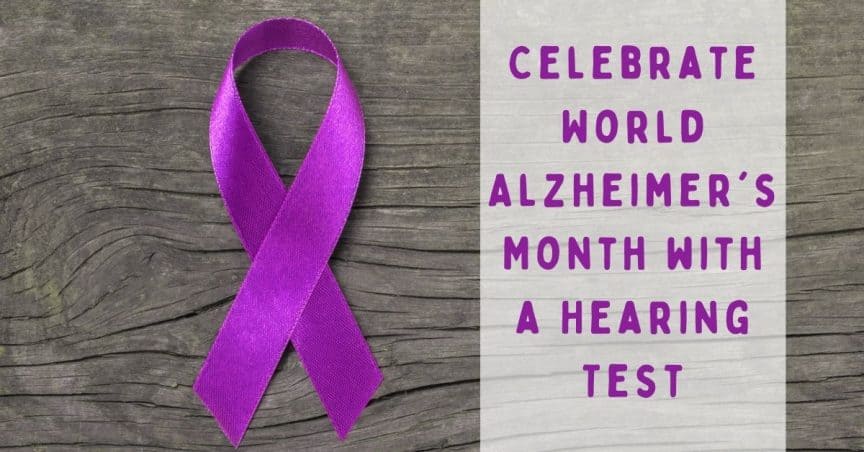- A Closer Look at Common Myths About Hearing Loss - May 7, 2024
- The Impact of Pets on Emotional and Hearing Health - April 26, 2024
- Strategies for Coping with Single-Sided Deafness - April 16, 2024
This month is World Alzheimer’s Month! Every September, Alzheimer’s Disease International raises awareness about dementia and Alzheimer’s disease. Worldwide, there’s still a lot of confusion about what dementia is and how it affects the brain. Millions of people face the stigma of Alzheimer’s disease as they struggle with memory loss or personality changes. You can participate in World Alzheimer’s Month by finding out more about Alzheimer’s disease and dementia.
Understanding Alzheimer’s Disease
Alzheimer’s disease is a degenerative brain disease. It causes cell damage and cell death in the brain. This can lead to rapid cognitive decline, changes in ability levels, and even changes in personality or mood. Adults over the age of 65 are the most at risk of developing dementia or Alzheimer’s disease. Younger adults can also have dementia. When they develop dementia, younger adults often experience more rapid cognitive decline.
As it progresses, Alzheimer’s disease starts to disrupt the networks in the brain. People will have a harder time thinking clearly or performing tasks. They’ll also notice changes in memory. Millions of people worldwide have dementia, but many don’t understand what’s happening in their brain.
The Signs of Dementia and Alzheimer’s Disease
Dementia and Alzheimer’s disease share many of the same symptoms. For example, both can lead to memory loss and trouble concentrating. Signs of Alzheimer’s disease can include:
- Noticeable memory loss that impacts daily life. You may forget where you put your keys, what time you have a doctor’s appointment, or what you did yesterday.
- Struggling to do tasks you used to find easy, like brushing your teeth or cooking breakfast.
- Language difficulties, like having a hard time to make sense of conversations. You may hear all the words, but can’t understand what people are saying. You may also have difficulty finding the words you want to say.
- It’s common for people with Alzheimer’s disease to feel confused. This could be forgetting the date or time, or even forgetting where you are.
- You may notice changes in judgement. For example, you may leave the house on a cold day without a coat.
- Having a hard time participating in social gatherings
- Experiencing changes in behavior, personality, or even mood.
Have you noticed any of these signs of dementia or Alzheimer’s disease? We recommend visiting your doctor as soon as possible. They’ll help you find ways to manage these symptoms and slow the disease as much as possible.
How Hearing Loss Can Lead to Alzheimer’s Disease
You may think that hearing loss is only in your ears. However, hearing loss affects your brain as well. When you live with untreated hearing loss, your brain isn’t hearing all the sounds around you. You strain to make out what people are saying, but you often end up frustrated. Hearing loss can lead to listening fatigue and put a lot of strain on your brain. In fact, hearing loss can lead to more rapid cognitive decline! Your brain won’t be in optimal health, and your hearing loss can lead to Alzheimer’s disease.
Treating Hearing Loss
Treating hearing loss is one way to reduce your risk of Alzheimer’s disease. Hearing aids can also help you manage the symptoms of dementia. A pair of quality hearing devices will make it easy for you to hear all the sounds around you. You will be able to have conversations without asking people to repeat themselves. You’ll even hear clearly in places with a lot of background noise!
When you treat hearing loss with hearing aids, you reduce your risk of Alzheimer’s disease. You’ll be able to hear without straining to hear, and help your brain stay healthy. You’ll enjoy conversations with loved ones, stay more social, and improve your cognitive health.
Celebrate World Alzheimer’s Month by visiting us! Start your visit with a hearing test. Our hearing health specialists will test your hearing at several pitches and volumes. Then we’ll go over the test results with you, so you can see what sounds you can hear.
Treating hearing loss with hearing aids will help you stay alert and active. You’ll be able to hear every word of conversations without straining to hear. This will keep your brain healthy, and reduce your risk of developing Alzheimer’s disease.

